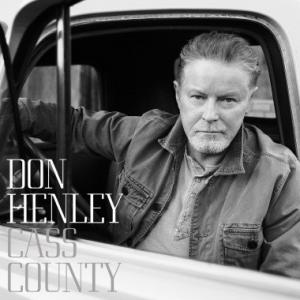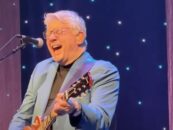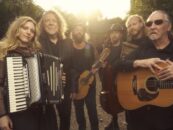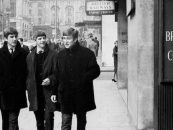Don Henley going country makes perfect sense even as it raises questions. First would be: What kind of country album? At a time when rockers are flocking to Music City as a career move – the genre is hot these days and its fans still seem to buy recorded music and concert tickets – the Eagle smartly eschews the vile but wildly popular bro country approach. Ergo this reviewer loses the chance to snark smack him with a line about “Crass Country.”
And that makes this guy happy even if slamming The Eagles, especially Don, is a popular (if by now rather tired) online sport. Nope, gotta give Henley some seriously respectful props on this disc, though questions remain.
The title tells the tale: Cass County is the far northeast Texas district where Henley grew up. This set’s about a boy from a small Texas town (yet still the county seat) now a man reconnecting with his roots… sort of.
Don could just as easily gone east to Nashville rather than west to Los Angeles back in 1970 when he left the Lone Star State. And with his emotive, honey-drenched gravel pipes and serious songwriting skills would have surely made his mark there (though one doubts he’d have had the astronomical success of The Eagles).
Related: Henley’s 2016 tour details
Cass County isn’t a roots country album that goes back to what likely surrounded Don in his youth: gutbucket C&W honky-tonk and Western swing. Rather, it’s the sort of album Henley might have made in the 1980s or ’90s if he’d had that possible country career, akin to the quality commercial country of, say, Rodney Crowell or Vince Gill… back when Music City hadn’t largely abandoned country and come under the undue influence of rock bands like… well, ironically, The Eagles (but let’s not blame them for just how bad much of what Nashville peddles under the country banner sounds these days).
So what you get is a very well-crafted recording with well-written songs – 10 of them by Henley and ex-Heartbreakers drummer Stan Lynch, with assistance here and there from Eagle Timothy B. Schmit and Eagles tour guitarist Steuart Smith, a veteran of Nashville’s tastier musical circles. Some address the sort of populist concerns that were once central to the country ethos, as exemplified by such titles as “The Cost of Living” (with a spot-on guest vocal by Merle Haggard to add extra gravitas), “Waiting Tables” and “Praying For Rain.” There’s heart wrenching tales of love lost like “Take A Picture of This” and “Words Can Break Your Heart” – both appealing and emotionally moving highlights. Steel guitar, mandolin, fiddle and harmonica add color atop acoustic guitar beds. We’re definitely talking country here. Just listen to his lively duet with Dolly Parton on the simply arranged Louvin Brothers chestnut “When I Stop Loving You,” the most deep roots track on Cass County. The man knows country and has a sure feel for it (the deluxe version songs also go deeper). And the many guests like Martina McBride on a duet and harmony/background vocals by the likes of Gill, Lucinda Williams, Lee Ann Womack, Trisha Yearwood, Alison Krauss, Jamey Johnson, Ashley Monroe, Michelle Branch and a couple of Dixie Chicks bring strengths to the numbers they appear on.
His one concession to contemporary Nashville is a sweet guest spot by his fellow small town northeast Texan Miranda Lambert – one of the few young country singers making records worth a damn these days in Music City – on the opening number, “Bramble Rose,” written by Americana darling Tift Merritt. Alas, the number is stained by the one bit of crass on this disc – Mick Jagger singing a verse that sticks out like a sore if not badly bruised thumb, a gratuitous move with no apparent purpose.
If you’re a new Best Classic Bands reader, we’d be grateful if you would Like our Facebook page and/or bookmark our Home page.
Which brings us with the big question here: Who’s the audience for this album? Eagles fans will get some echoes of that band’s vibe, like the vocal harmonies on “Praying For Rain” and the snarling electric guitars on the closing number, “Where I Am Now” (which, on the other hand, is also a lively country dancehall two-stepper). Many of the song melodies ring with a familiarity that recalls Henley’s famed band. But this album is a far cry from The Eagles – nothing here rocks and the cynical Hotel California consciousness seems a whole other universe – and even further from the innovative progressivism of Henley’s best earlier solo work. And as far as the country demographic goes, the sound on here has been largely left behind by that genre’s new and younger Southernish suburban fans who embrace a tackily twangy sub-par rockist approach.
No matter; it’s not like Henley needs a career boost. So what we get is likely an expression of what he sings about on that final song: Who he is and where’s he’s at now, largely living back in Texas, matured past The Eagles but still creatively nimble. Hence it’s a sincere endeavor free of market calculation on which his voice shines, the songs cajole and seduce, and his genuine affection for country should appeal to anyone who admires craft, real sentiment and the true spirit of country music.
Never miss a post! Sign up for Best Classic Bands‘ Newsletter; form is on every page.
- The Beatles at Budokan in 1966: Tokyo Rocks - 06/30/2025
- Love & Mercy: Best Rock Star Biopic Ever? - 06/13/2025
- The Rolling Stones’ Summer of ‘Satisfaction’ - 06/06/2025







No Comments so far
Jump into a conversationNo Comments Yet!
You can be the one to start a conversation.